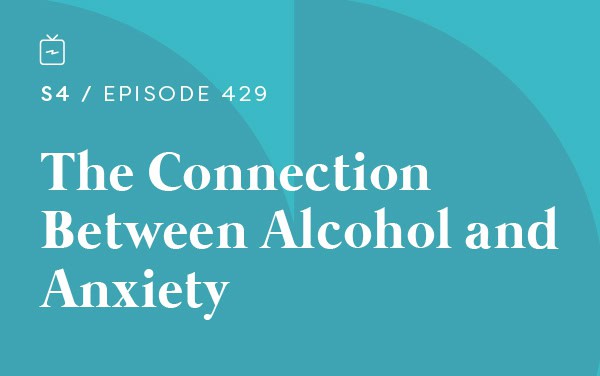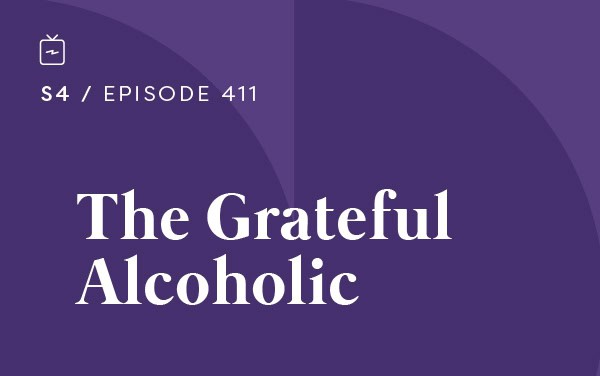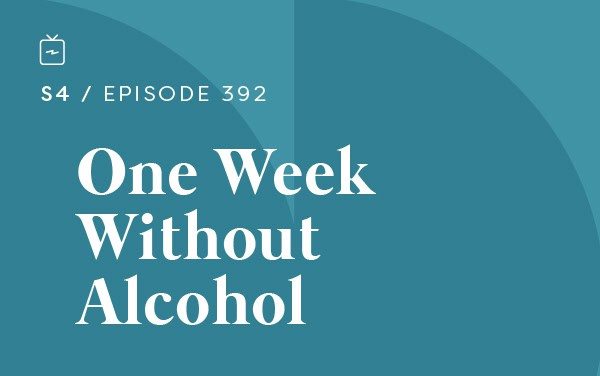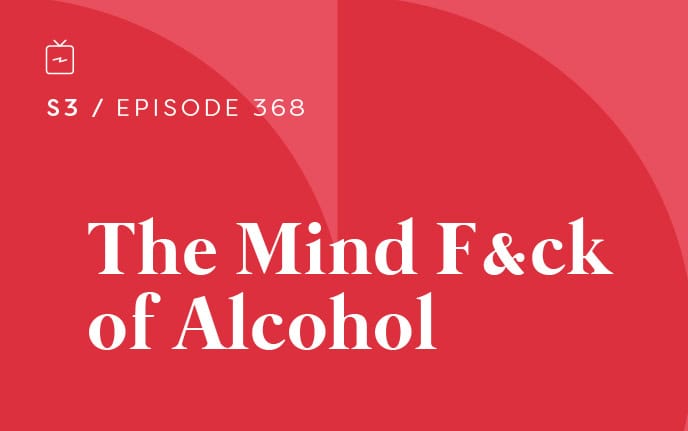
by Kris Oyen | May 8, 2023 | Podcast
Podcast: Play in new window | Download
Subscribe to the Recovery Elevator Podcast Apple Podcasts | | More
Episode 429 – The Connection Between Alcohol and Anxiety
Today we have Dale, he is 55, from Roanoke, VA and he has been alcohol free since March 23, 2019
Exact Nature: https://exactnature.com/RE20
[02:34] Paul’s thoughts:
Paul knows now that there is a connection between his drinking and his anxiety but while actively drinking, he could not. We are told that alcohol relaxes us – which it does by shutting down important parts of our brain.
According to Dr. Sheila Shilati,”Alcohol ultimately replaces those important chemicals like dopamine and serotonin in the brain, which mitigate anxiety, therefore, in episodes where you are not drinking, then your brain is searching for those all-important ‘feel-good’ connections, which become diminished because the supply has been mitigated,”
We hear a lot about “self-medicating” in recovery. Which isn’t a bad thing, but when we rely too much on this strategy, it stops working. This becomes an even bigger problem because we don’t realize it so we just drink more and now our coping strategy is becoming the reason we can’t cope.
Paul shares in episode 417, this is the best place you can be because the tipping point isn’t far off in the distance.
Better Help: www.betterhelp.com/elevator – 10% off your first month. #sponsored
[10:48] Paul introduces Dale:
Dale is 55, lives in southwest Virginia, has been married for 25 years with no children. He works for a shipping company and also owns and manages rental property. Dale enjoys music of all varieties, loves reading and learning and also enjoys gardening.
Dale’s first experiences with alcohol came from his parents using it to medicate him as a child. He worked in the hospitality industry in his late teens and early twenties and drinking was a glorified part of the lifestyle. His tolerance grew and he became a daily drinker throughout that time.
The recent years found Dale questioning his drinking and realizing he wasn’t living life within his values. He had sneakily drunk some of his wife’s special whiskey which prompted an angry text to Dale. He used this message as motivation and although he was not able to quit right away Dale feels this was the start of his recovery.
Dale has found self-awareness to be a catalyst to helping him stop drinking. He has utilized Recovery Elevator and the Café RE community as a large part of his journey. It was a scary first step for him, but he found getting out of his comfort zone to be very helpful. He has made many friends that have helped him move forward and be strong in his sobriety. Focusing on the good has been an important tool for Dale, specifically in the early days. As he closed in on a year, he felt the veil had been lifted and he was seeing the world differently.
Year two for Dale was unpacking everything that led him to drink so much in the first place. He feels that was the mucky part of the journey and it is a process to unpack it.
Year three Dale feels that learning to let go of control was a big thing. Learning that life is going to happen, and he didn’t have to cling so tightly to everything. He finds that the service work he does in the community has helped him deal with life as it happens while approaching the four-year milestone.
Dale feels that success comes by building the wall one brick at a time, stepping outside of the comfort zone and being willing to learn. He also feels that service work helps strengthen us and keep us connected to our foundation.
[53:36] Closing thoughts:
Paul’s tips for dealing with anxiety without alcohol:
Perception – anxiety pangs are messengers. Your body is sending you signals that something is off balance. Tell your body this will pass and will soften with each passing day or month.
Get the body moving to cue the release of endorphins whose purpose is to mask physical and emotional pain.
Cafe RE Use the promo code OPPORTUNITY to waive the set-up fee
Recovery Elevator YouTube
Sobriety Tracker iTunes
Recovery Elevator
It all starts from the inside out.
I love you guys

by Kris Oyen | Jan 2, 2023 | Podcast
Podcast: Play in new window | Download
Subscribe to the Recovery Elevator Podcast Apple Podcasts | | More
Episode 411 – The Grateful Alcoholic
Today we have Lisa who is 65 from Atlanta, GA took her last drink on 11/17/2022.
Whether you are on day 1 or day 1000, there is still time to join REStore. The next class is tonight at 8:30pm EST
There are still spots open for our next sober travel trip to Costa Rica from April 12th-21st for more information click the link Costa Rica 2023
Highlights from Paul:
Paul didn’t understand a fellow AA member’s references to being a “grateful alcoholic”. Only after getting to know Jim, did he understand what they meant. It took a few years for Paul to get to that point to be grateful for his addiction.
He reflects that our addictions are signposts trying to guide us to a more authentic life and that there are no such things as failures. They are learning opportunities and we should never give up. We should trust the process of healing from the addictions, and we can all become grateful for the role that alcohol has played in our lives.
Better Help: www.betterhelp.com/elevator – 10% off your first month. #sponsored
[00:00] Paul introduces Lisa
Her last drink was November 17, 2022 – a little over three weeks from the time of this recording. She says it feels wonderful, relieving, liberating, comforting, all positive things.
Lisa is 65 and lives in Atlanta area with her husband of 36 years. They have two grown children and remain close to them. She enjoys reading, travelling, exercise, nature and family time.
Lisa’s drinking started out on the weekends in high school. She drank throughout adulthood and always knew she drank abnormally. She discovered she had her first blackout and fell when she was nearly 50. That scared her into getting sober with AA but she feels she never did the work or found a good sponsor. After one year, she thought she could handle drinking again.
Over the last two or three years she has known she needed to stop again. She was starting to notice the health consequences and began finding resources including The Huberman Lab podcast episode about alcohol, and This Naked Mind.
Journalling about her drinking past has helped her recognize some of what drove her to addiction. She became aware that her drinking ramped up after she retired in 2015 as she felt a loss of identity. She has recently become a caretaker for her mother who has been in recovery since Lisa was 15, but they have never been close. She thinks she used alcohol for stress and anxiety relief over that and the loneliness she found in retirement. Now that she knows that it is her brain reacting to the disease which she finds helpful to her recovery. She embraces that she must do things differently this time and get comfortable with being uncomfortable. She has joined several recovery communities and asked to be on the podcast. She has not shared her journey with her immediate family but plans to do so very soon.
In recovery, Lisa says that routine is vital to her success. She exercises daily while listening to podcasts. She enjoys volunteering to stay busy. Her faith is very important to her and she finds prayer and journalling helpful.
One thing she has learned in sobriety – she can find the courage to do hard things and is stronger than she realized
Parting piece of guidance – you can control your thoughts, just focus on what you are gaining, not what you are losing.
[00:00] Closing thoughts from Paul:
Paul encourages us to stop labeling things as a problem. We need challenges to appreciate rewards. He compares this to alcohol as being the invitation to step into a rebirth and make great changes in our lives for the better. He has yet to meet someone that regretted quitting drinking. Paul also revisits his thoughts on Big Alcohol and his view on legalization of drugs and alcohol.
Connect with Cafe RE – Use the promo code OPPORTUNITY to waive the set-up fee.
Recovery Elevator YouTube – Subscribe here!
Sobriety Tracker iTunes
I love you guys.
We took the elevator down; we’ve got to take the stairs back up.
We can do this.

by Kerri MacFarlane | Oct 15, 2022 | Alcohol Free, Blog, Helpful Tips, Resources, Science and alcohol
Let’s talk about science and alcohol. It’s a pretty interesting and popular subject when the topic of recovery and sobriety gets brought up.
But let’s keep in mind that it’s not enough to rely on science and information to ditch the booze. Yes, it’s interesting and knowledge is power, but please don’t solely rely on knowledge, science and information alone to quit drinking. If we could read or listen ourselves out of a drinking problem, well, the problem would be solved. ??
Paul loves the science part of addiction and recently did a podcast intro on just that. (RE Episode 396)
Paul got most of his info from a fantastic podcast episode from the Huberman Lab Podcast, What Alcohol Does to Your Brain, Body & Health| Episode 86. I highly recommend you check it out and listen when you get a chance…Dr. Huberman goes into great detail in this 2 hour episode and even those without a drinking problem will find it interesting and beneficial.
Andrew Huberman, Ph.D., is a neuroscientist and tenured Professor in the Department of Neurobiology at the Stanford University School of Medicine.
Alcohol and the brain. ??
Alcohol has many biochemical and neurochemical effects on the brain. There are dramatic changes in the neurons that control the release of serotonin when we consume alcohol. Serotonin is the feel good chemical and 80% of it is created in the gut. When we mix alcohol and serotonin it gets converted into acetaldehyde. Acetaldehyde damages your DNA and prevents your body from repairing the damage. A toxic buildup of acetaldehyde can increase your cancer risk.
This acetaldehyde acts as a toxin at the very synapses and the connections between the serotonergic neurons and lots of other neurons. In other words, when we ingest alcohol, the toxic effects of alcohol disrupt those mood circuitries.
It does this first ☝?by making them hyper active.
This is why people become happy or more talkative after a couple of sips of alcohol. But when the alcohol wears off the serotonin levels and the activity of brain circuits really start to drop and this is why most people head to the bar for a second round. Now typically what happens when people ingest their 3rd, 4th or 5th drink, there is an absolute zero chance of them recovering that energized mood they experienced on the first drink. Most people, when they drink more and more, begin to feel suppressed ?. The front part of the brain, the frontal cortex, is starting to shut down. The motor areas of the brain that control motion and basic functions begin to slow.
This is the slurred speech, the swaying back and forth, the classic drunk shuffle. People begin to lean on things, uncomfortable benches seem like a good place to spend the night. There is a great depression, not of the psychiatry sort, but a depression of alertness and arousal, and eventually people begin to pass out. ?
Here’s one big way that alcohol changes your brain chemistry.
Alcohol changes the relationship between the hypothalamus, the pituitary gland and the adrenals. The hypothalamus, which is about the size of a gumball and sits above the roof of the mouth, provides a specific set of signals for the pituitary gland…which then releases hormones into the bloodstream that go and talk to you adrenals which sit right above your kidneys in your lower back. The adrenals release a chemical called epinephrine and cortisol which is involved in the longer term stress response.
The hypothalamus, the pituitary gland and the adrenals maintain the physiological balance of what you perceive as stressful. People who consistently drink are more stressed out at baseline then sober peeps. They have more cortisol released from their adrenal glands even when they are not drinking. And a consequence of this is they feel more stressed and feel more anxiety when they are not drinking. Most medical professionals will agree that stress is the number one contributor to disease.
Let’s talk about blackouts for a second. Blacking out is not passing out. When we overload the brain with alcohol, it’s almost too much to process and the activity of neurons in the hippocampus, which is involved with memory formation, are strained and then they completely shut off. As in you no longer form memories. You are still awake and can still be functioning, some high functioning, but the memory forming part of your brain, the hippocampus, clocks out.
Now…to genetic predisposition…
Side note, Paul doesn’t believe in genetic predisposition to alcoholism. He used to, but now he doesn’t.
Addiction guru Dr. Gabor Mate’s teaching rebukes the genetic myth. Dr. Mate feels all addictions are trauma responses. What helped Dr. Mate reach this conclusion was his studying of twins who have the same genetic makeup. He also studies twins with the same genetic makeup who are separated at birth. His conclusion is that all addictions are environmental responses, or coping behaviors that allow people to survive in unhealthy environments.
Dr. Bruce Lipton, who is coined the father of Epigenetics in the 90’s, would also agree with this. Epigenetics says it’s the environment that controls the expression of genes and gene mutations. In addition, it’s the environment that cues anxiety, depression, addiction, auto immune responses, cancers, inflammations, and not genetics. The classic Rat Park experiment by Bruce Alexander in the 70’s also shows addictions are environmental.
Paul says, “I am on board with this approach and even in the past 8 years doing Recovery Elevator, I’ve seen the pendulum slightly shift in this direction.” What we’re seeing now, is our biological makeup is much more adaptive and reflexive to environments than previously thought. Again, Paul feels, most addictions are trauma based. They are adaptive behaviors. Another reason he doesn’t think alcoholism is genetic is because alcoholism is rapidly on the rise. Gene’s take thousands, millions of years to evolve. Gene’s can’t explain the ten fold increase in alcoholism we’ve seen in the last couple centuries.
That being said, we do want to share different perspectives on alcoholism.
Dr. Huberman feels alcoholism is genetic. He does mention that there is no blood test, fingerprint test, or bio marker to indicate this addiction gene. Dr. Huberman says the best way to “identify” alcoholics and non alcoholics is by putting drinkers in two bins. One bin is the group of people who have a couple of drinks and then get tired with a nodding head, or they feel sedated. The other bin of people is the group that has a couple of drinks and gets energized and are not sedated. The drowsy group after a couple drinks are your normal drinkers. The let’s go streaking in the quad and bring your green hat group are the future alcoholics.
Is it genetic based, or trauma based. Most likely it isn’t 100% one or the other. It’s most likely a combination of 57,680 different things.
Again, we don’t recommend getting too caught up in all this. At the end of the day, you’ve got a drinking problem. Knowing what alcohol does to your prefrontal cortex isn’t going to keep you sober in the long run.
Find what works for you…and go with that!
***Taken from Recovery Elevator Podcast, episode 396, host Paul Churchill***

by Kris Oyen | Aug 22, 2022 | Podcast
Podcast: Play in new window | Download
Subscribe to the Recovery Elevator Podcast Apple Podcasts | | More
Episode 392 – One Week Without Alcohol.
Today we have Megan. She is 34, from Florida, and has been sober since June 22, 2021.
Gruvi: https://www.getgruvi.com/
Highlights from Paul
Stacking days, which is a day here, and a couple of days there, is fantastic, but your body and mind will respond faster to continuous sobriety, and I think a week is the most doable chunk of time. I know for me, even 30 days was overwhelming.
Day 1: Drink water, then more water. Eat at least one full, healthy meal. Your body is detoxing today. Anxiety is part of this. Embrace the process. Remember the pain. Exercise will help with sleep. Sleep won’t be great, and night sweats are expected. Expect cravings, and ice cream is your friend.
Day 2: Expect to be tired, exhausted, and anxious. Drink water, sleep, eat ice cream and worry about sugar later.
Day 3: Sleep should improve and welcome back appetite. Eat a healthy breakfast.
Day 4: Your body is healing. Drink water, sleep and eat (sugar does help with cravings.)
Day 5: What happened? You may be sleeping better, and you are hungry. Eat some healthy food and don’t worry about calories. Your brain is coming back on, which has two sides: your cognition is better, and the thinking mind is on overdrive.
Day 6: Your confidence is building, and your energy begins to return. Inflammation begins to dissipate.
Day 7: Sleep! Cellular restoration. Mental clarity improves.
Tips for week one:
Drink plenty of water
Exercise for at least 20 minutes. It gets endorphins going
Eat at least one meal with healthy greens
Put pen to paper and capture your insights
Remember, it’s a week and not forever.
Seven days is the start of the healing process. Your seven days await – go get ’em.
Paul describes PAWS (Post Acute Withdrawal Symptoms) in this video
https://www.youtube.com/watch?v=esHLnz-BUXw&t=1s
Better Help: www.betterhelp.com/elevator – 10% off your first month. #sponsored
[15:40] Megan has been sober for over a year. She lives in Orlando, has two kids, is a social worker, and is getting a master’s in criminal justice. She loves to travel and has been to 25 countries. She loves the beach, music, theater, working out, and theme parks.
Megan grew up in a conservative religious home with no alcohol in the house. Her grandfather was a recovering alcoholic. Alcohol was a big part of her family history, and Megan experienced a lot of generational trauma. Megan’s father passed away when she was 15, and her childhood abruptly ended. Coincidentally she had her first drink that year.
Megan started using alcohol as a coping mechanism in her early twenties. Her marriage, work, and being a grown-up were a lot to manage. In 2021 she started working for a men’s prison, which changed her life. Giving something back and witnessing other people’s trauma helped her harness her inner strength. Megan was able to share her story and learned to adopt solid self-care practices. Slowly, she started to heal.
Today, Megan sees sobriety as a beautiful way to live, even if incarcerated. She credits the men at the prison with helping her to get sober. Her sobriety tools include self-care, Café RE, leveraging an accountability partner, focusing on the good in life, and great friends. Instagram: magicalsobermama
Kris’s Summary
Together is always better. Kris just returned from the Bozeman retreat, and he loved getting to see all the participants.
Upcoming events, retreats, and courses:
- You can find more information about our events
Resources
Connect with Cafe RE – Use the promo code OPPORTUNITY to waive the set-up fee.
Recovery Elevator YouTube – Subscribe here!
Sobriety Tracker iTunes
Recovery Elevator-
We are the only ones who can do this, but we don’t have to do it alone.
I love you guys.

by Kris Oyen | Mar 7, 2022 | Podcast
Podcast: Play in new window | Download
Subscribe to the Recovery Elevator Podcast Apple Podcasts | | More
Episode 368 – The Mind F&ck of Alcohol
Today we have Stephen. He is from New Jersey and took his last drink on September 15, 2020.
Ditch the Booze: https://recoveryelevator.com/cafére Promo Code: OPPORTUNITY
Highlights from Paul
Paul shares an email from a listener who asks Paul how people without a drinking problem can get help. He talks about the A&E show “Intervention” and how he often watched it while drinking alone, grateful he didn’t have a problem with alcohol. The show, Intervention gave Paul countless examples of how alcohol “f&cks” with your mind. After 276 interventions on the show, 270 accepted treatment, with 151 remaining clean and sober today, which is a 55% success rate. If those numbers are accurate, they are much more optimistic than the broadly accepted low teen success rate you hear from the industry.
Paul reminds listeners that you probably have a drinking problem if you are listening to a sobriety podcast. The point of addiction is to get to know yourself and love yourself.
Better Help: www.betterhelp.com/elevator
[13:10] Stephen is 45 and lives in New Jersey. He is a father (a “girl dad”), coach, and owns his own business. He loves coaching, sports, and everything outside.
Stephen’s relationship with alcohol evolved over 25 years. Alcohol was his biggest challenge, but he also used marijuana. He dabbled in underage drinking and had fun on the Jersey shore. He managed his drinking well for many years. When his second daughter was born, he began to acknowledge his drinking was problematic. His drinking escalated over the years. He and his wife danced with moderation, and he occasionally took days off drinking. Stephen was the driver of the drinking in his marriage.
Stephen credits Paul Churchill’s book with getting him sober. He tried several programs before he found Recovery Elevator. Ultimately, he went to a four-day detox. He was full of energy and enthusiasm after leaving detox. He relapsed a few times but rallied and has been able to stack days. Mismatched drinking habits pushed the end of his marriage. Meditation, journaling, exercise, and accountability are his best sobriety tools.
Value Bombs
- Learning that alcohol was the symptom, not the problem, was eye-opening
- Enjoy the moments
- Once it gets good (in sobriety), it gets great quickly. Everything compounds.
Odette’s Summary
If you are seeking anything outside of self, you are taking the long way home. Odette reminds us that everything we need is inside of us. There is no shame in having doubt. Stay on the path! Remember, you are not alone. Together is always better.
Upcoming events, retreats, and courses:
- You can find more information about our events
Resources
Connect with Cafe RE – Use the promo code OPPORTUNITY to waive the set-up fee.
Recovery Elevator YouTube – Subscribe here!
Sobriety Tracker iTunes
Recovery Elevator – it all starts from the inside out. I love you guys.







